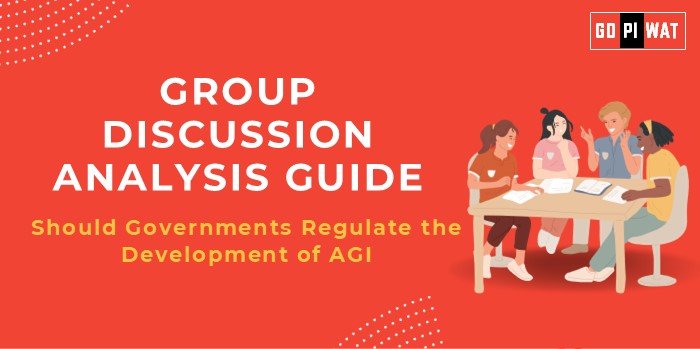📋 Group Discussion (GD) Analysis Guide
Should Governments Regulate the Development of Artificial General Intelligence (AGI)
🌐 Introduction to AGI Regulation
Opening Context: Artificial General Intelligence (AGI) represents a transformative leap in technology, with the potential to match or surpass human intelligence in various tasks. As nations race toward its development, questions about its societal, ethical, and safety implications demand attention.
Topic Background: AGI, unlike narrow AI, aims to perform any intellectual task a human can, posing risks like misuse, economic disruption, or loss of control. Governments face the challenge of balancing innovation with public safety.
📊 Quick Facts and Key Statistics
- Global AI Investment: $94 billion in 2023, projected to double by 2030 (Statista).
- Economic Impact: AI could contribute up to $15.7 trillion to the global economy by 2030 (PwC report).
- Safety Risks: 72% of experts agree AGI regulation is essential to prevent existential threats (Future of Life Institute, 2023).
- Governance Initiatives: EU’s AI Act aims to regulate high-risk AI systems comprehensively.
👥 Stakeholders and Their Roles
- Governments: Enact regulations, ensure ethical standards, and monitor AGI development.
- AI Companies: Drive innovation while adhering to ethical frameworks.
- Academia: Conduct independent research to assess AGI risks and solutions.
- International Bodies: Coordinate global policies to address cross-border risks.
- Civil Society: Advocate for transparency and accountability.
🏆 Achievements and Challenges
✅ Achievements:
- AI adoption in healthcare and education has revolutionized access and efficiency.
- AGI prototypes contribute to solving complex problems, from drug discovery to climate modeling.
⚠️ Challenges:
- Potential misuse in warfare or surveillance.
- Economic disruptions due to automation.
- Lack of global consensus on regulatory standards.
🌍 Global Comparisons
- US vs. EU: The US promotes innovation with minimal regulation, while the EU emphasizes ethical oversight.
- China: Focuses on AI for economic and military purposes, with strict government control.
📌 Case Study:
OpenAI’s GPT models demonstrate AGI’s potential for both innovation and misinformation risks.
📖 Structured Arguments for Discussion
- Supporting Stance: “Government regulation is essential to mitigate existential risks and ensure ethical deployment of AGI.”
- Opposing Stance: “Overregulation could stifle innovation and allow less ethical nations to dominate AGI development.”
- Balanced Perspective: “Governments should regulate AGI, but in collaboration with industry stakeholders to maintain innovation.”
🗣️ Effective Discussion Approaches
- Opening Approaches:
- Start with a statistic on the economic potential or risks of AGI.
- Reference a notable case study like OpenAI’s GPT developments or AI safety concerns raised by leading experts.
- Counter-Argument Handling:
- Highlight the necessity of balance, emphasizing successful regulatory examples (e.g., EU’s AI Act).
- Use evidence of AGI misuse risks, like deepfake proliferation.
📋 Strategic Analysis of Strengths and Weaknesses
- Strengths: Technological advancement, economic growth, addressing global challenges.
- Weaknesses: High development costs, ethical violations, public skepticism.
- Opportunities: Leadership in AGI innovation, creation of international cooperation frameworks.
- Threats: AGI misuse by rogue states or corporations, public backlash over privacy and job losses.
🎓 Connecting with B-School Applications
- Real-World Applications: AGI regulation intersects with finance (automation risks), operations (supply chain optimization), and ethics (corporate responsibility).
- Sample Interview Questions:
- “How should businesses adapt to the ethical challenges posed by AGI?”
- “Discuss a policy framework you would design for AGI regulation.”
- Insights for Students:
- Explore projects in AI ethics or impact assessment.
- Consider internships at firms focused on AI governance.


